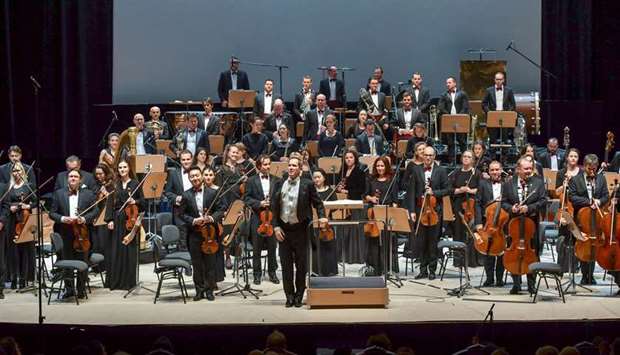The Qatar Philharmonic Orchestra (QPO) recently set out its musical voyage for 2020 with an impressive concert with nostalgic tunes in presence of an august audience.
The opera house of Katara Cultural Village was full to its capacity as the concert was a sold-out show. Members of the diplomatic community in Doha and the appreciators of the Western classical music were literally mesmerised by the orchestral music with the overtone of piano. Not a single soul left the auditorium until the orchestra stopped playing their instruments.
The orchestral concert was exquisitely led by Alastair Willis, a Grammy-nominated conductor. Under his guidance, the orchestra presented classical symphonies in a perfect erythematic and melodious way.
Alastair is the music director of the South Bend Symphony Orchestra. In the past seasons, he has guest-conducted orchestras around the world including the Chicago Symphony, Philadelphia Orchestra, New York Philharmonic, San Francisco Symphony, Mexico City Philharmonic, Orquestra Sinfonica de Rio de Janeiro, Nordwestdeutsche Philharmonic, Hong Kong Sinfonietta, China National Orchestra (Beijing), and Silk Road Ensemble (with Yo-Yo Ma) among many others. His recording of Ravel’s L’Enfant et les Sortileges with Nashville Symphony and Opera for Naxos was Grammy nominated for Best Classical Album in 2009.
Alastair completed a successful four year tenure as music director of the Illinois Symphony Orchestra. Last season, he was re-engaged by the QPO, Victoria Symphony B.C., North Carolina Symphony, Dresden Philharmonic, Orquestra Sinfonica Barra Mansa, Symphonia Boca Raton, Pacific Northwest Ballet and Orchestra Seattle/Seattle Chamber Singers, and made his debuts with the Wichita Symphony, Boise Philharmonic, Illinois Philharmonic Orchestra, South Bend Symphony Orchestra and Roosevelt Contemporary Ensemble. This season he returns to Seattle Symphony, Pacific Northwest Ballet, Boca Raton Symphonia, and makes his debut with Philharmonie Südwestfalen.
Dr Waseem Kotoub, a British national of Lebanese origin, enthralled the audience with his skill and dexterity over piano. Every one enjoyed his mastery as he received warm accolades from the guests during the intermission.
Dr Waseem is a professional pianist that has a high sensitivity and deep understanding in his piano playing. He was born in the UK and received most of his musical education from Vladimir Zaretisky. He has already gained a solid pianistic experience and was awarded a scholarship from Said Foundation to study at the Royal Academy of Music in London with Diana Ketler and Colin Stone which he graduated from with merit and got his PGdip in piano performance and the LRAM in music teaching.
Dr Waseem has participated in several master classes with eminent musicians such as Imre Rohman, Christopher Elton, Victor Bunin, Paskal Nimorofski and Petras Guiniasis. As a special prize winner of IBLA piano competition in Italy, first prize winner of Said Foundation Achievement Award he has been playing with several orchestras such as Brandenburg National Youth Orchestra, Syrian National Symphony Orchestra under the baton of many conductors such as Solhi al-Wadi, Ahmad al-Saiedi (director of Egyptian opera house), and Sebastian Wiegle.
The concert started with Mephisto Waltz No.1, S. 110/ 2 by Franz Liszt. The composition was played for 11 minutes. Then the orchestra performed Franz’s Concerto for Piano and Orchestra No. 2 in A Major, S.125. There were four other compositions. Adagio sostenuto assai – Allegro agitato assai was played for seven minutes; Allegro moderato for eight minutes; Allegro deciso – Marziale un poco meno allegro for seven minutes and Allegro animato for two minutes.
Franz Liszt (1811–1886), one of the most impressive figures in all of music history, was a Hungarian composer, virtuoso pianist, conductor, music teacher, and organist of the Romantic era. He was also a writer, a philanthropist, a Hungarian nationalist and a Franciscan tertiary.
The second half of the orchestra concert included compositions of Johann Strauss (1825-1899), Franz Lehár (1870 – 1948), Josef Strauss (1827 – 1870), Emmerich Kálmán (1882 – 1953), and Johann Strauss, Jr. (1825 – 1899).
The compositions of Johann Strauss were namely: Fledermaus: Overture (1874) for nine minutes; Pleasure Train Polka (1864), Op. 281 for three minutes; Persian March, Op. 289 for two minutes; Thunder and Lightning Polka, Op. 324 (1868) for three minutes.
The other compositions were: Merry Widow: Ballsirenen Walt by Franz Lehár; Feuerfest (Fireproof)! Polka-Francaise, Op. 269 by Josef Strauss; Countess Maritza, Overture by Emmerich Kálmán; and Bauern-Polka Op. 276 by Johann Strauss, Jr.

GRAND: The orchestra all set to start the concert led by Grammy-nominated conductor Alastair Willis. Photos by Noushad Thekkayil
